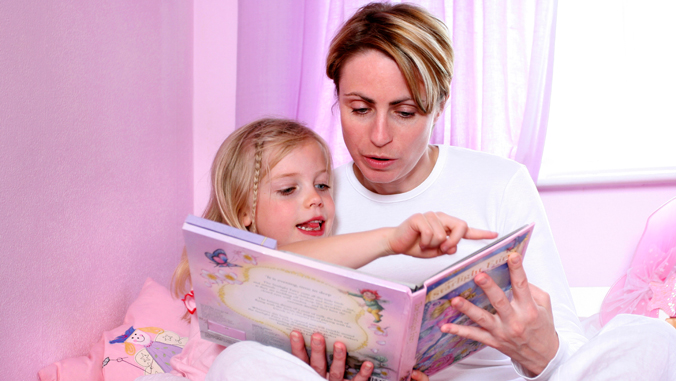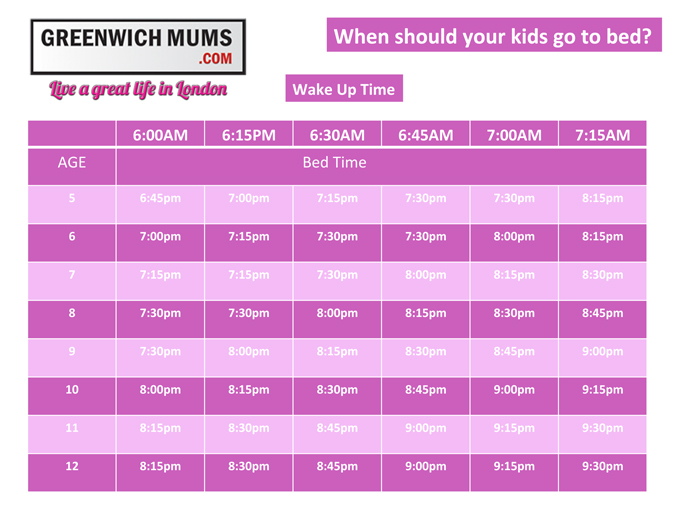Babies bedtime, now that is a tough question. I’ll always remember when another mum at nursery first asked me when our girls go to bed; after answering 7 pm; she looked horrified.

“Why what’s wrong with 7 pm is it too late?”
“No, no,” she said, “It’s great, I couldn’t get Fred into bed before 9 pm if I tried!”
The truth is, and this is not at all showy, my kids have always been good sleepers. From about ten weeks old they were sleeping all the way through the night for about five nights a week, by 12 weeks we were done!
Even now aged 6 and a half they nevertheless go to bed at 7 pm, and wake at 6 am – just about six mind in one’s case. Now we’re certainly not perfect, and some night’s it’s a real struggle at bedtime with both of them messing around – but we still keep to that time, roughly.
I’ve read that Doctors do recommend children aged 3 to 6 need about 10 to 12 hours of sleep every night. With 7 to 12year olds doing best with 10 or 11 hours.
Why?
Not getting enough sleep can lead to weight gain, as well as taking a toll physical, emotional, and social health. Not to mention the in school problems with bad behaviour that an overtired child can experience.
So what is the best bedtime for your child?
If you’re not sure about the hours and the timings. We’ve put together this handy chart for you to download and keep to help you ensure your kids are getting the right amount of rest.

As for getting them into bed.
Paediatrician Dr Jennifer Shu recommends creating a nightly routine to help them wind down; after much discussion here at Gmums HQ we like her “4 B’s method: bathing, brushing, books, and bedtime.”
See below.
Bathing
Baths are a soothing, hygienic and decisive way of separating the evening’s eating activities from sleeping. There’s no way around it — only the most unbelievably fatigued child will sleep his way through a bath.
(If that or something similar has happened to you, please let us know in the comments below)
That means that when feeding time is over, your child will get the message that eating is not in any way, shape, or form a cue to go to sleep.
Brushing*
Whether you choose to brush your child’s teeth (or gums) right after the last feeding or just before the actual bedtime itself, we strongly encourage you to get in the habit of having a toothbrush (or washcloth or gauze) be the last thing in your baby’s mouth at night (other than, perhaps, a clean pacifier).
Books
We’ve found nothing more suitable as a breast/bottle stand-in than books at bedtime. Since you don’t want food or drink to become your child’s bedtime source of comfort, books can serve as the perfect cue that it’s time to cuddle up and go to sleep.
Think about what happens when you’re tired and you try to read? Bingo — you fall asleep. When it comes to lifelong healthy habits, we can’t think of a better one.
Bedtime
Short of drugging kids (which we don’t condone, no matter how tired or tempted you might be); it’s mighty hard to force a child to fall asleep. We suggest you stop trying and instead stick to implementing a regular time for your child to get ready for and get into bed. Once you’ve set the stage so that bathing, brushing, and books signal bedtime, you should just let your child fall asleep independently.
Sure, this may involve some additional challenges, protests, and even the need to consult other parenting resources (of which, we can assure you, there are many).
In the end, though, we have always found that if you do a good job of making the bed, your child will learn to lie in it.*
You must be logged in to post a comment.